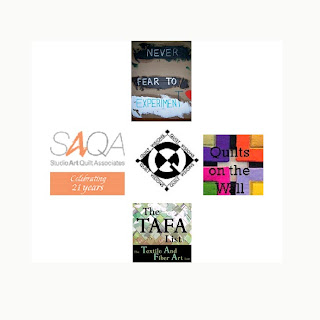A site dedicated to fiber arts, art quilts, soft sculpture, surface design, and optimizing techniques in other artistic media.
Thursday, March 31, 2011
Fabric and Fiber Bead Play
Instead of putting my fabric scraps into the scrap bag, I've started pulling out pieces that are large enough to cut at least 1" strips out of and making fiber beads. Today was a day to "play" with them. As time goes by, the pile will surely grow.
Wednesday, March 30, 2011
Grandma's Attic
The last couple of days have been great fun. Another of my works, "Grandma's Attic" was included in an Etsy Treasury that can be seen at
http://www.etsy.com/treasury/4d2cfb08cd5b6d9108bb76c8/grandmas-treasures
http://www.etsy.com/treasury/4d2cfb08cd5b6d9108bb76c8/grandmas-treasures
Monday, March 28, 2011
Etsy Treasury
I just got word that my "Escape and Return" art quilt is in an Etsy Treasury today. The treasure can be seen at www.etsy.com/treasury/4d91646689646d91d3576dd5/escapes.
Saturday, March 26, 2011
"Farewell Toast to Winter"
This week I finished two more art quilts and today listed one of them, "Farewell Toast to Winter," on Etsy.com. This was a fun and challenging work to execute. Instead of traditional batting, I used stiff interfacing because I knew that the dense thread drawing would tend to pucker and would need a strong stabilizer. That choice became the major challenge because the interfacing creates lines where it is bent. Instead of this being a negative, it yielded an opportunity for further thread embellishment and texture. Here are some photos of the piece.
Full Front Image
28 3/4" x 14 1/2"
Close-up of Stitching (Vase Bottom)
Closeup of Stitching (Stemware)
Closeup of Flower Shape
Reverse
Wednesday, March 2, 2011
Silk Screen - Great Instructions found
A while back I experimented with using old, thick, white, fence paint to mask a silk screen that I made from a large embroidery hoop. It worked out very well but I am running low on this thick paint that is not useable for anything else. Moreover, the need to mask the projects in the garage and the drying time made this method of masking silk screens a bit laborious. Here is a picture of the screen I made using this method.
Close-up Of Second Screened Heart Image
Today I set about searching the Internet for silk screen masks and found that Speedball carries rather reasonable products that mask and will clean out of the screen with soap and water when desired. The ones that most interest me are the Speedball Screen Drawing Fluid and Speedball Screen Filler. First a design can be drawn onto the screen with a brush using Screen Drawing Fluid. When that is dry, the Screen Filler is applied. When the Screen Filler is completely dry, cold water washes out the Screen Drawing Fluid but leaves the Screen Filler and then the screen is masked and ready to use.
Super! I've ordered one bottle of each of these items and will write about their effectiveness when I use them. These items are available on-line at various sites; however, I ordered mine from Dick Blick.
I also found a tremendous site that gives detailed instructions on various silk screening techniques including step by step instructions on how to use the Drawing Fluid and the Screen filler. If you're interested, check out: http://www.reuels.com/reuls/Silk_Screen_Printing_Instructions.html.
In order to screen the heart onto the figure I made a quick mask using a sheet of overlapping masking tape onto which I drew a heart and then cut it out with a craft knife. Then I affixed that sheet of tape to the back of a small embroidery hooped screen.
Small screen for heart image
Close-up Of Second Screened Heart Image
Since I had two more T-shirts to screen, I had to wash out the screen between printings so that the ink wouldn't set up and ruin the screen. The washing process loosened the tape significantly and it was difficult to execute a clear print by the thrid screening.
Today I set about searching the Internet for silk screen masks and found that Speedball carries rather reasonable products that mask and will clean out of the screen with soap and water when desired. The ones that most interest me are the Speedball Screen Drawing Fluid and Speedball Screen Filler. First a design can be drawn onto the screen with a brush using Screen Drawing Fluid. When that is dry, the Screen Filler is applied. When the Screen Filler is completely dry, cold water washes out the Screen Drawing Fluid but leaves the Screen Filler and then the screen is masked and ready to use.
Super! I've ordered one bottle of each of these items and will write about their effectiveness when I use them. These items are available on-line at various sites; however, I ordered mine from Dick Blick.
I also found a tremendous site that gives detailed instructions on various silk screening techniques including step by step instructions on how to use the Drawing Fluid and the Screen filler. If you're interested, check out: http://www.reuels.com/reuls/Silk_Screen_Printing_Instructions.html.
Subscribe to:
Comments (Atom)
















